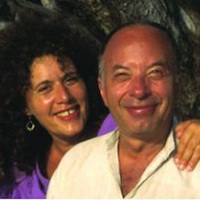“Happiness cannot come from without. It must come from within.” ~ Helen Keller
It would seem that regardless of emotional and physical hardships there is a place inside each of us that is essentially happy and free—but we have a tendency to ignore this place, or to think that being happy is dependent on circumstances or fortune.
Some years ago we were in Pondicherry, India, walking through the city as night fell, stepping carefully to avoid rats and dog pooh, when we saw two boys preparing for bed, which was on the hard concrete of the sidewalk. What really struck us was, in spite of their clear hardships, they were laughing loudly and happily.
Then, the other morning we were going to the gym, when we passed a little girl holding hands with her father. The girl was happily skipping along. Obviously, this was because skipping and jumping are expressions of happiness. But it made us think about how we express our happiness once we get to be adults.
For Deb, the little girl skipping “made me remember that when I was little I used to sing to myself. No particular tune or song, but I would often find myself humming or singing without even realizing I was doing it. Ed says I still do that. The interesting thing is that, even though I didn’t have the happiest of childhoods—mother divorced father for cruelty, I was in boarding school from age eight, and so on—there was a happiness inside me that was all mine, untouched by drama, trauma, or circumstance.”
While for Ed, “I used to dance on stage with my sister and brother; we had a whole dance routine the three of us would do together. I come from a one-bedroom apartment in the Bronx with a stepmother who made life difficult, but I was always able to find a place to dance. When I danced I was at my happiest, it took me out of my daily reality and was the way I could really express myself. I was even a dancing teenager on television and won the NYC dance championships!”
In the West we correlate happiness with economic prosperity: the more we have the happier we are meant to be. As Danny DeVito jokingly said in a movie: “You wanna know what life’s about? I’ll tell you. You accumulate as much as you can and whoever has the most at the end wins.”
But in Bhutan, a small but beautiful country in the Himalayas squeezed between northern India and China, they determine their country’s wealth by the quantity of Gross National Happiness (or GNH): people’s level of happiness serves as a monitor for the economic and development plans of the country.
Bhutan is not a materially rich country and life for most people is hard—there were no roads before 1960, they farm the high mountain fields with oxen, and certainly most don’t have central heating or air conditioning. But their happiness is that deep sense of appreciation and inner contentment. This is seen in their sense of community and caring for one another, and their radiant smiles.
“Gratefulness is the key to a happy life that we hold in our hands, because if we are not grateful, then no matter how much we have we will not be happy—because we will always want to have something else or something more.” ~ Brother David Steindl-Rast
Given the current economic difficulties many people are facing, perhaps this is the perfect time to reassess what gives you happiness and how you express it—to reconnect with the inner joy that made you either skip or run when you were younger—for it is easy to forget to be happy. Do remember, unconditional happiness is an inside job. Supreme happiness is within you.
****
Meditation – The Best Friend You Will Ever Have
A 4-week webinar (on-line course) with Ed and Deb Shapiro, on discovering the greatest friend you could have: meditation. Starts October 25 but you can join in and download classes anytime.
~
Editor: Kate Bartolotta










Read 3 comments and reply